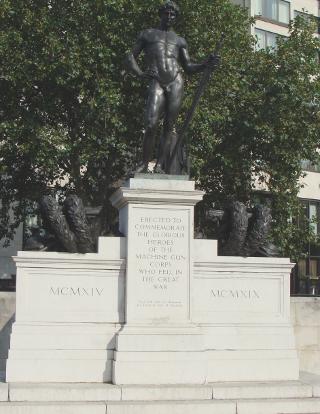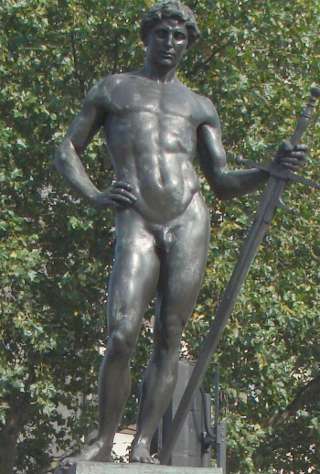War, Memory, and Eros
I’ve blogged here before about the work of Paul Fussell, and fate has thrown me an opportunity to do so again.
Fussell’s The Great War and Modern Memory (1975) won the National Book Award for Arts and Letters and the National Book Critics Circle Award for Criticism when it appeared, and re-reading it today it is not hard to see why. A book primarily about the British experience in the First World War, it is one of the most beautifully written and evocative scholarly books on war I have ever encountered, strange as it may seem to call a book on horror and tragedy and waste “beautifully written.” It’s a rare example of a book that I think every English speaker who aspires to be well-educated ought to read.
So to my considerable delight, I discovered that Sterling Publishing has recently put together a handsome illustrated edition of Fussell’s classic. My copy arrived in the mail last week, and I have been examining it with great interest since. I even found something of interest for ErosBlog.
Fussell has a section entitled “Mars and Eros,” in which he discusses, among other things, the way in which the homoerotic tradition in Victorian and Edwardian Britain influenced the way the war, and in particular soldiers in the war, were perceived and represented. (The ways in which art, particularly literature, structures people’s experience of events is a central theme of the book.) This is a rich topic, worthy of whole books in itself, and the compilers of the new edition came up with a picture of this memorial as an illustration:

This is the “Boy David” memorial to the Machine Gun Corps in London. The inscription on it reads “Erected to commemorate the glorious heroes of the machine gun corps who fell in the Great War.” And fell they did: according to the Wikipedia article on the MGC, of 170,500 officers and men who served in the First World War, 12,498 were killed.
More than all the adult men in the town I grew up in. More than all the male students at a pretty large university. Most of them young, some of them probably still in their teens. Cut down.
And they are memorialized with this:

A beautiful boy. An erotic image of one, I think few would deny.
Inappropriate on a war memorial? No. Entirely appropriate. A reminder of what war takes away.
Shorter URL for sharing: https://www.erosblog.com/?p=4811








Well, only if all nudity is erotic; which I guess is something entirely in the eye of the beholder.
[Oops] I’m almost certain, for example, that the editors of this volume:
http://www.pur-...=1759
had no erotic intent in mind when they picked that cover.
Alex, I think you misunderstood Dr. Faustus.
You and I (and Faustus, I imagine) are agreed that eroticism is in the eye of the beholder. But Faustus isn’t claiming that all nudity is erotic, so how does pointing to your purported example of nudity used without erotic intent serve to dispute his assertion?
I don’t see where you found “all nudity is erotic” either in his post or necessary to support it.
Dr. Faustus! I read The Great War and Modern Memory as a freshman in high school for an honors history class. Needless to say the chapter entitled ‘Soldier Boy’ gave the Catholic students in the class alot to talk about. So glad I’m not the only one who appreciated the blatant eroticism.
how about this one?
http://www.abmc...t.pdf
cover page.
Fussell’s observations are fine and trenchant, but if you want to see violence, war, and eroticism taken to their absolute limit, read Klaus Theweleit’s =Male Fantasies=, (2 volumes). There’s simply nothing that can compare to it. The work is stunningly original.
with even more wonderful bad taste, the biblical quotation on the other side of the plinth reads: “Saul has killed his thousands, and David his ten thousands!”